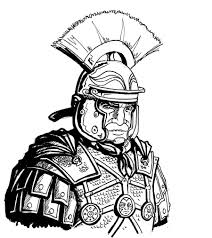
Herod is successful in all he undertakes, from obtaining and maintaining despotic power over Judea throughout the political changes and Actian war, gaining authority over every ruler in Judea, and even the priesthood. He appointed Aristobulus, the last of the Maccabees as high priest, when he married his sister Mariamne. When Aristobulus later denounced some of his policies, he had him murdered. He murdered anyone he suspected of threatening his rule. He undertakes and completes tremendous building projects, including cities, fortresses, and a great expansion of the second temple. He is famous for his decree of slaughter for the babes of Bethlehem, in an attempt to put to death Immanuel. The dynasty of Herod will remain in power until the destruction of Jerusalem. Herod the Great himself will reign until shortly after the Slaughter of the Innocents.
Anticipating an attack, Anthony's fleet went toward Italy, getting as far as Corcyra. But finding the sea guarded by a squadron of Octavian's ships, he retreated to Patrae, with his infantry encamped near the promontory of Actium and his fleet in the Ambracian gulf. While Anthony waited at Patrae for the full strength of his forces to arrive from their scattered locations, Octavian's general Agrippa decended with his cavalry through Greek towns and coasts, until he had driven Anthony from the north side of the straight.
Cleopatra advised putting the infantry into strong towns, and returning with the main fleet to Alexandria. Octavian learned of this, and while he at first considered letting Anthony sail and then attacking, Agrippa convinced him to give battle immediately. The day was wet, and the sea was rough when the trumpet sounded and Anthony's ships began exiting the straight. Octavian's ships moved into line and remained quiet. He then ordered them to the right to pass the enemy ships. In danger of being surrounded, Anthony was forced to sound an attack.
Marc Anthony had 500 ships, most of them huge warships with grappling hooks and battering rams. Unfortunately, they were undermanned, as too many men had succumbed to malaria while wintering at Patrae. Anthony did his best, burning ships he could no longer man, and keeping a tight formation. But with so many oarsmen missing or incapacitated, his principle weapon was far less effective.
Octavian had 250 smaller and highly maneuverable ships manned by fresh men. General Quintus Dellius defected to Octavius, and revealed Anthony's battle plans. Anthony had planned to break through the north of the Octavian line with his heaviest ships, but knowing this, Octavian's ships stayed out of range.
Cleopatra saw an opening to open sea, and signalled a retreat. Anthony failed to see the signal (rainy day, remember), and thought this was a panic, and all was lost. So he also turned abruptly and sailed after Cleopatra. The rest of the fleet was lost to Octavian.
Octavian exerted himself to saving the crews of the burning vessels, and also treated the surrendering infantry, who had not already escaped to their home countries, with dignity. This gained Octavian the loyalty of most of the infantry - who thought they had been abandoned by Anthony.
“Caesar went for Egypt through Syria when Herod received him with royal and rich entertainments; and then did he first of all ride along with Caesar, as he was reviewing his army about Ptolemais, and feasted him with all his friends, and then distributed among the rest of his army what was necessary to feast then withal” (Wars I, 20, 3).Octavius Augustus sent an expedition into Edom, Moab, and Ammon under Aelius Gallus, in which he was joined by 500 of Herod’s guards (Josephus, Ant. XV 9, 3). Dean Prideaux refers to this expedition and its failure, citing Pliny, Strabo, and Dio Cassius (Prideaux’ Connections. Vol. II, pp. 605 et seq.). The Universal History, in a note added to their account of the expedition, says: "The bad success that attended Aelius in this expedition deterred both him and others from any further attempts on that country" (Ancient Universal History. Vol. XIII, p. 498).
“When Caesar afterwards, approaching from Judea, took Pelusium and entered Egypt, the same author says, ‘Cleopatra had erected near the temple of Isis some monuments of extraordinary size and magnificence. To these she removed her treasure, her gold, silver, emeralds pearls, ebony, ivory, and cinnamon. . . . . Caesar was under some apprehensions about this immense wealth, lest, upon some sudden emergency, she should set fire to the whole. For this reason he was continually sending messengers to her with assurances of generous and honourable treatment, while in the meantime he hastened to the city with his army.’ . . . . Her person and the treasures in the monument were afterwards secured by a stratagem, as related by Plutarch; and thus a king of the north had power over the treasures of gold and silver, and over all the precious things of Egypt.”See Ezekiel 29:15 for why this alone rules out a futurist interpretation of this passage.